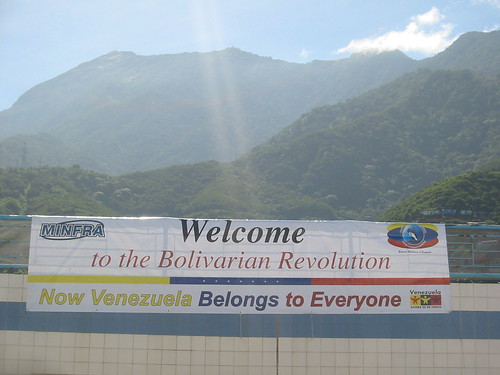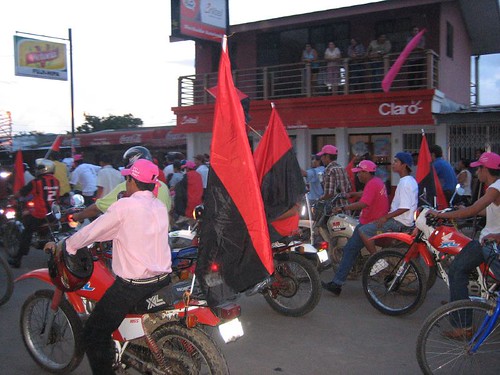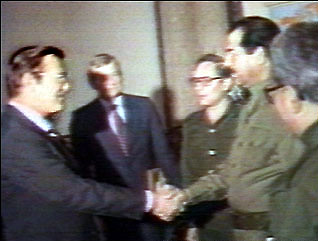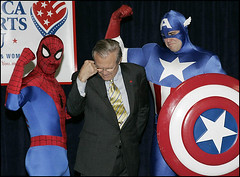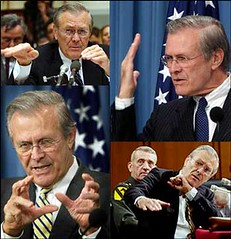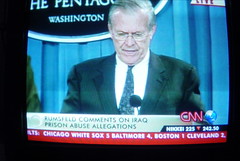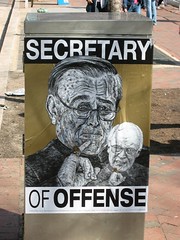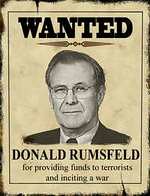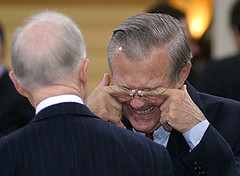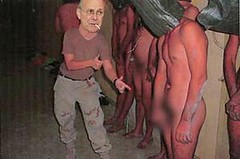Monday, November 20, 2006
Nepal: King Blamed for deadly crackdown on protests
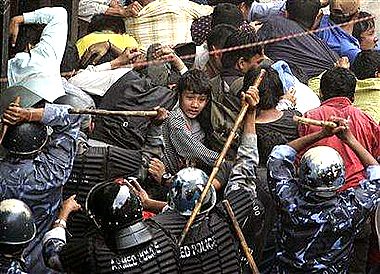
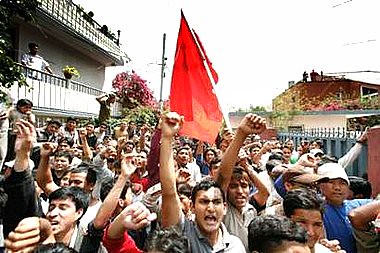
Mon Nov 20, 3:33 AM ET
by Binaj Gurubacharya
KATMANDU, Nepal - A government commission investigating Nepal's bloody crackdown on pro-democracy demonstrators blamed the violence on the country's king and recommended punishing the monarch, officials said Monday.
It was unclear, though, what the penalty against King Gyanendra might be. Nepal has no laws concerning how to punish crimes by a king and the case is the first involving a monarch in a country where kings are revered as near-deities.
Prime Minister Girija Prasad Koirala said those found guilty in the commission's report would be punished.
The April crackdown left at least 19 people dead and hundreds injured and eventually forced the king to cede power and reinstate parliament after 14-months of direct rule by the monarch.
Parliament then quickly stripped Gyanendra of his powers, his command over the army and his immunity from prosecution.
The commission questioned top government and security officials. It also sent written questions to the Gyanendra, but the king did not respond, giving no reason.
Commission member Harihar Birahi said the investigation focused on official misuse of power, state funds and human rights abuses during the king's authoritarian rule.
Besides Gyanendra, the commission also found another 201 officials in the king's administration responsible for the bloody crackdown.
They included the chiefs of the police and the armed forces. The chiefs of the civil and armed police have been suspended while the army chief has retired.
Hundreds of pro-democracy activists were also detained during the April crackdown, and some said they were tortured.
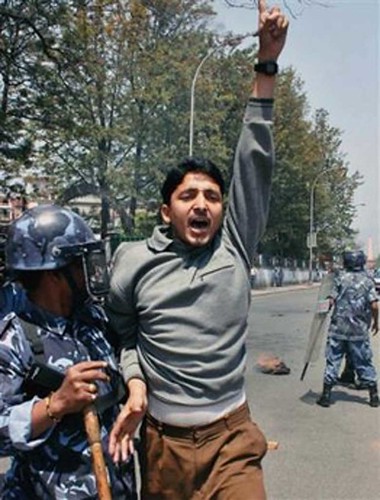

Thursday, November 16, 2006
Remembering movement journalist Brad Will... with a protest in solidarity with Oaxaca!
For the past two weeks, friends of slain activist and Indymedia journalist Brad Will have been doing an immense amount of organizing to carry on his memory and in solidarity with the struggle in Oaxaca that he died documenting. The outporing of activity and creative resistance brought on by this tragedy has been inspiring and a worthy tribute to Brad’s spirit. The October 30 protest at the New York Mexican consulate in particular combined the spirit of militant direct action with a series of beautiful artwork, and a memorial bike ride saw a ghost bike ridden by a likeness of Brad, camera in hand.
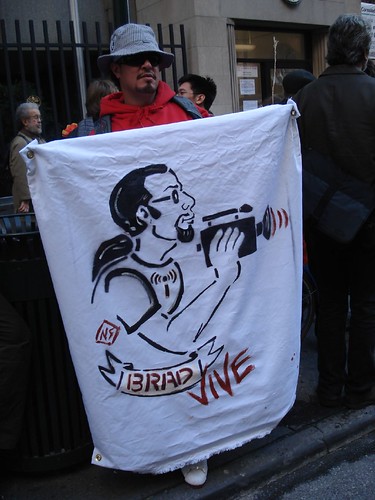
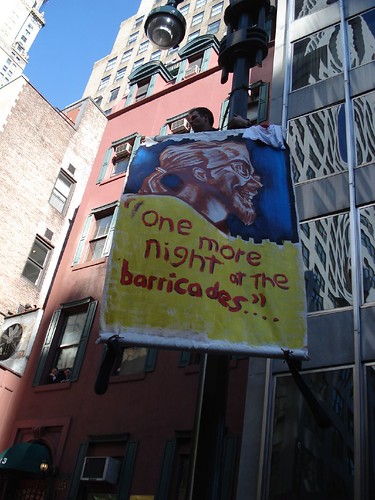
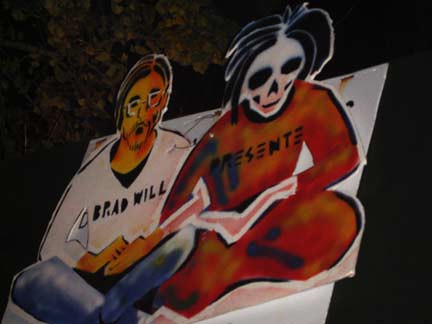
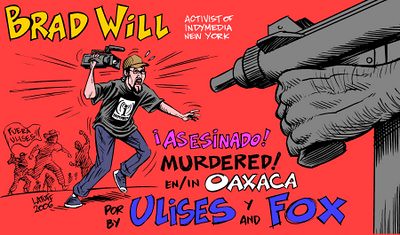

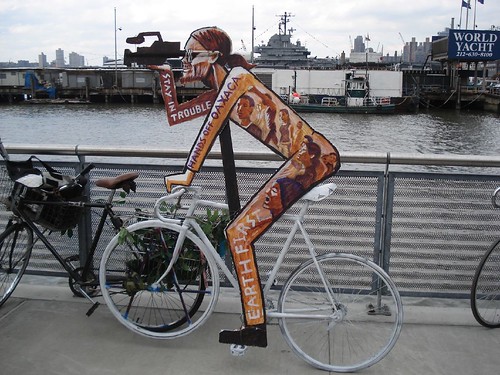

 Protester in front of the Mexican Consulate remembering journalist Brad Will who was killed in Oaxaca by mexican police, NY 2006
Protester in front of the Mexican Consulate remembering journalist Brad Will who was killed in Oaxaca by mexican police, NY 2006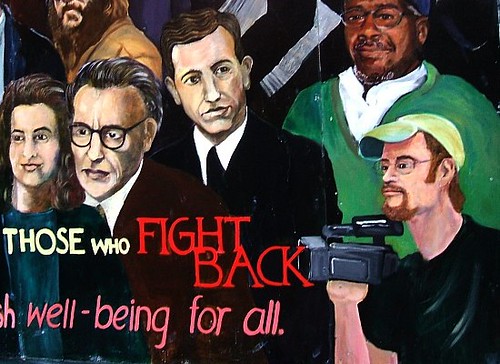
Wednesday, November 15, 2006
Internationalist Murals from Belfast and Derry, Ireland


Revolutionary murals from the north of Ireland have unofficially become a staple of this blog. And they're always painting new ones, so I'll keep posting them.
Again, the internationalism and connectedness with other struggles is right up front.
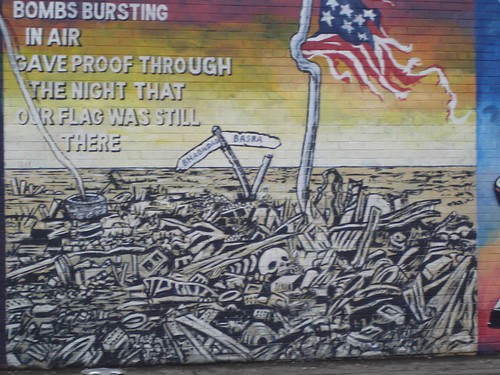
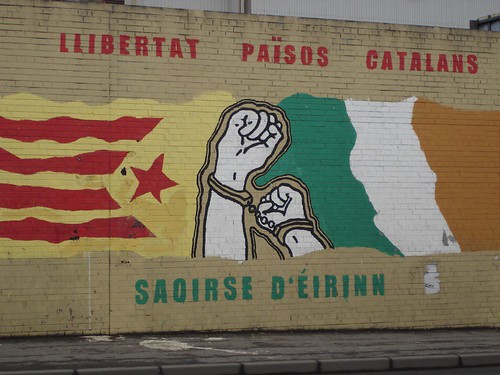
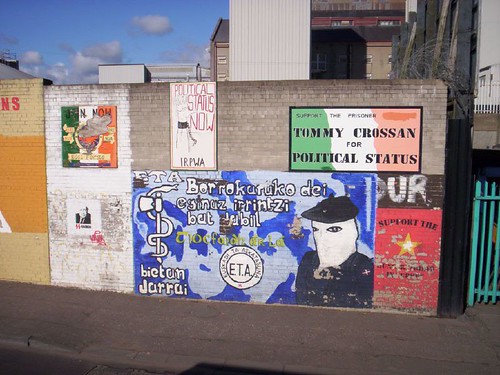



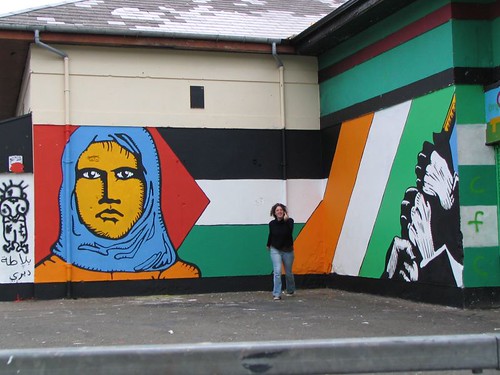
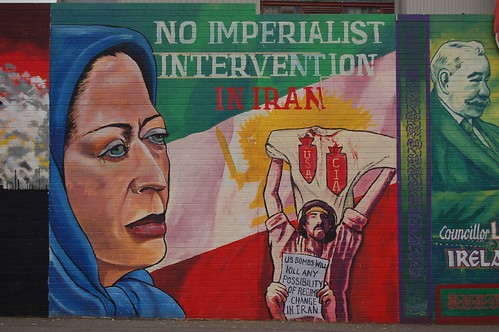

Interview with Lebanese Communist about Hezbollah
Hezbollah and Resistance
The viewpoint of the Lebanese Communist Party
Marie Nassif-Debs
Question: The Lebanese Communist Party is a secular party, engaged in the national resistance. What have been its relations with the Hezbollah? Marie Nassif-Debs: There have been big changes in this relation over the last 20 years. Twenty years ago the Hezbollah began by waging a merciless war against communists. I think that the Islamic fundamentalist tendency, which was especially represented by the Da’wa - an Islamic fundamentalist party which had backing from Iraq and in Iran, made up not only of Shi’ites, but with a majority of Shi’ites - saw in the PCL a party that was opposed to it on everything. It wanted to suppress any idea of secularism, openness, different philosophy, and so on.

Relations began to be very tense and the Hezbollah went so far as to kill several of our comrades, especially intellectuals, cadres from the universities. For example, they killed Mahdi Amil, who had worked on the problems on colonialism and of religion and who was a very great intellectual, a very great philosopher.
And there was also Hassan Mroue, a great philosopher who wrote a very important book, which has been translated into French, and whose title is “The Materialist Tendencies of Islam”. He had begun by being a sheikh, he wanted to study in Najaf in Iraq. There he discovered that it wasn’t what he was looking for and he became a communist. He wrote many books.
There were small scale combats, in Beirut, in the western Bekaa, in several regions, in places where there was a relationship of forces such that one side could suppress the other. That also helped the Syrian tendency to eliminate communists from the national resistance.
There was a certain understanding between the Syrian forces and the Hezbollah, and also other forces. We were hunted, there were comrades who went to carry out resistance operations and they were killed - they had been shot in the back.
After that relations evolved in a positive way. In the Israeli prisons and camps, the communists and Hezbollah were side by side. A majority of communists and fewer Hezbollah. They got to know each other there and that created relations between the cadres of the two organizations. And after they were released the relations more or less evolved.
Furthermore, on the level of its thinking, the Hezbollah has evolved, especially after the election of Hassan Nasrallah to the position of general secretary. Because - this is a point of view that many comrades share with me - he is much more Arab than Muslim, in other words, he looks at things through the eyes of an Arab: he doesn’t want to liberate Jerusalem because it iss one of Islam’s holy places, but because the Palestinians have to go back to the land of their ancestors, have to have their own state... He has a vision that is different from that of his predecessors. Then we had relations that were more or less mitigated, sometimes good, sometimes bad.
And now?
Our relations have especially evolved since the last Israeli aggression, where we ourselves called for the formation of a national resistance front and formed militias which opposed the entry of Israel into several villages, including certain attempts by Israeli commandos to enter them - in the Bekaa, near Baalbeck, where we stopped the commando which wanted to move into Jameliyyah, a village with a communist majority. We had three comrades killed there.
We are still a little bit skeptical in our relations with the Hezbollah, because up to now there are points of dispute between us. For example as concerns the elimination of the confessional regime [1], they don’t have a very clear position, although they have evolved.
We had a difference with them in the summer of 2005, after the withdrawal of Syrian forces. During the legislative elections the Hezbollah felt it necessary, to protect itself from Resolution 1559 [2], to make an alliance with those who awere pro-Syrian and who subsequently became transformed into pro-Americans, i.e. the Lebanese Forces, Hariri (Mustaqbal) and Joumblatt’s PSP. It is thanks to this alliance that the March 14 forces [3] - Hassan Nasrallah admits it - won a majority and were able to form a government. Because if the Hezbollah had made an alliance with the communists and with certain Aounists [4], that majority wouldn’t have existed.
So we consider the Hezbollah as a party of resistance, which is part of a movement of national liberation on the national and Arab level, but we have differences with it on how to resolve the political and economic situation in Lebanon. But on these questions also it has evolved, especially over the last four months: it took part in a very real way in the demonstration on May 10. However, up to now they have not taken a position on many problems. They have two ministers including the Minister of Energy. At the moment they are talking about privatizing electricity in Lebanon, and he is a bit lukewarm, he is not combative.
The second problem is that the Hezbollah has not taken a position on the question of the regime, of political reforms that go into the direction of secularism and modernization. These are two essential points of dispute. And we have a third one: we were against the re-election of the President of the Republic, Emile Lahoud, in 2004 and the Hezbollah supported Lahoud.
Do you see possibilities for a further evolution of the Hezbollah?
They are more or less grouped into two big tendencies. The tendency of the Da’wa, i.e. the one that just wants Islam. And the other tendency, the one which has evolved, which talks about sharing power, which talks about an alternative, and so on. I don’t think that they have any choice but to continue evolving; we are going to continue the discussion with them and we think that if they don’t evolve they will lose the fruits of victory, for the second time ... because what happened in July and August, I call that a victory. We stood up to Israel, the strongest power in the region...
We think that if the Hezbollah wants to take advantage of the victory, if it wants the Lebanese to take advantage of the victory, it has to evolve, otherwise we will go back to the same point as in 2000. In 2000 it was thanks to the Islamic resistance that our country was liberated, for the first time in Arab history. But the victory was devoured by confessionalism. I think that some of Hezbollah cadres understood that. And we hope - because there is a continual battle inside their party - that they will not lose again, by once again adopting confessional positions.
Is the national resistance front which was established during the war going to continue?
We are continuing to discuss an alliance on the political front with the Hezbollah and with the Aounists. Many of their cadres see in Aoun someone who has opposed the Christian fascists. There is a strong d Aounist groundswell among young people, especially in the universities. To start with it was a movement for freedom from Syrian control, but it is being carried along by a wave of Arab sentiment. It is which is really posing the problems that are essential for Lebanon, and also the question of reform.
It goes further than the struggle against corruption, there is also a demand for real secular changes. That creates a possibility for a real coming together. The former Prime Minister, Sclim Hoss, is also very open, with a very Arab outlook, and she sees the essential points in this way: we are working towards a regroupment so as to establish a government of national alliance and to force fresh legislative elections, on the basis of an electoral law that would be proportional and secular, in order to subsequently elect the President of the Republic, amending the Constitution so as to suppress political and administrative confessionalism.
And you are discussing all that with the Hezbollah?
Yes! Of course we are discussing that. Because we said to them - and I think they have really understood this - that a great personality like Nasrallah, such a charismatic personality, can be an emblem for the whole Middle East (and not only for the Arab Middle East), but he can’t become President of the Republic in Lebanon. If we want people to be able to occupy the essential posts in the state, then we have to suppress confessionalism. Because now, if he stood in the elections, although he would be supported by almost all the Shi’ites and although there are many Christians who like him, so even if he can have the majority with him, he cannot become President!
You can be very big on the international level but very small and very restricted on the national level with this confessional regime. Of the 128 members of the Parliament, half are Muslims and within this half there a third of Shi’ites. So the Muslims cannot increase the number of their members of Parliament, they cannot increase the number of their representatives in the government, because there are quotas.
So either we suppress the quotas and then everyone can compete in the elections on the basis of programmes that are well defined on the social, economic, and political level, and so on, making real alliances, or else it’s the quota system. There are many people who are starting to think about this impasse ...Apart from the Communist Party and some left groups, all the political parties are confessional: the Hezbollah and Amal are Shi’ites, the Lebanese Forces are Maronite (there are also a few Greek Orthodox among them), the PSP is Druze, Hariri’s Party of the Future is Sunni’, and so on. We have a system which reproduces itself because we always have members of tparliament who are elected on a confessional basis and who make laws in such a way as to preserve their interests.
There have been civil wars and they were based on religion. Although there were fundamental problems on the social, economic, and political level, these problems were swept aside.
This interview was conducted on 21st September 2006 in Paris by Mireille Court and Nicolas Qualander.
![]() Marie Nassif-Debs is active in the National Conference for the Elimination of Discrimination against Women. She is an active member of the Lebanese teachers’ union, a writer and journalist, and a member of the Political Bureau of the Lebanese Communist Party (PCL).
Marie Nassif-Debs is active in the National Conference for the Elimination of Discrimination against Women. She is an active member of the Lebanese teachers’ union, a writer and journalist, and a member of the Political Bureau of the Lebanese Communist Party (PCL).
NOTES
[1] This refers to the system whereby posts in the government and administration are attributed according to quotas for each religious group, i.e. the President of the Republic must be a Maronite Christian, the Prime minister a Sunni Muslim, and so on.
[2] A 2004 Security Council resolution which demanded among other things, that all Lebanese militias should be disarmed and disbanded.
[3] Name given to the coalition of anti-Syrian forces.
[4] Followers of the retired Christian general Michel Aoun.
San Francisco Labor Council supports the struggle in Oaxaca

"Teachers, teach the struggle, don't leave the struggle" Oaxaca, Mexico 2006
[Note: The following resolution was adopted unanimously by the Delegates Meeting of the San Francisco Labor Council on Monday, November 13, 2006.]
Resolution in Solidarity with the People of Oaxaca
Whereas, 70,000 teachers in the State of Oaxaca, Mexico -- organized in Section 22 of the National Teachers Union (SNTE) -- went on strike in May 2006 demanding that all teachers across the State receive wage increases and wage parity, and that all school children be provided with shoes, breakfast and uniforms to go to school; and
Whereas, in June 2006, the government of the State of Oaxaca, led by Governor Ulises Ruiz Ortiz, unleashed the first brutal attack against the strike encampments set up by teachers and their supporters; death squads working with state authorities assassinated striking teachers; and
Whereas, the people of Oaxaca -- through their labor, community, political, religious and indigenous organizations -- then rallied behind the teachers and formed a Popular Assembly of the Peoples of Oaxaca (APPO) to urge the authorities to meet the strikers' just and legitimate demands, and, with the Teachers, to demand the resignation of Governor Ruiz. At that point it became not only a teachers' strike, but a powerful people's strike for justice and against violent repression; and
Whereas, on October 29, 2006, the Federal government of President Vicente Fox sent in 4500 special troops to tear down the barricades and many of the encampments that the Teachers and people of Oaxaca had created to defend their strike; and
Whereas, Mexicans across the political spectrum have commented on the not-so-behind-the-scenes role of the U.S. Embassy. The Bush-appointed U.S. Ambassador Tony Garza stated on October 28 that the Fox administration had delayed too long, and needed to send in Federal troops to Oaxaca. An hour later Fox announced his decision to send in troops, which he implemented the following day; and
Whereas, over the first six months of struggle in Oaxaca, more than 20 people have been killed, including a north American video journalist, and hundreds wounded by troops, police and paramilitary forces. Hundreds have been "disappeared" (many of them feared dead). And many hundreds of union and community activists have been jailed. Yet the popular forces in their hundreds of thousands have continued to march.
Therefore Be It Resolved, that the San Francisco Labor Council, AFL-CIO, joins with labor and democratic rights organizations in Mexico and around the world in urging the federal and state governments in Mexico to seek every avenue to a peaceful solution to the conflict in Oaxaca; and
Be it Further Resolved, that we urge the Mexican authorities to settle the conflict by meeting the legitimate demands put forward by the teachers and the Popular Assembly of the Peoples of Oaxaca, including: (1) Immediate withdrawal of all troops and paramilitary units from the city and state of Oaxaca, (2) Stop the repression and state-sponsored killings, (3) Removal from office of Governor Ulises Ruiz Ortiz, instigator of the reign of terror, (4) Release all detainees and political prisoners, and (5) Governor Ruiz and others responsible must be brought to justice.
Be it Finally Resolved, that we forward these demands to our Labor Councils, National Unions, State Federations, AFL-CIO and Change to Win Federation,urging them to embrace these demands and to act in solidarity with the teachers and popular movement of Oaxaca.
(Resolution submitted by Dave Welsh, NALC #214; Alan Benjamin, OPEIU #3; and Frank Martin del Campo, LCLAA)


Saturday, November 11, 2006
Fighting Back in a city that's barely there
If the writing is by someone with an antiracist and working class political orientation who actually knows the city from the bottom up, of course I'm quite interested in hearing what they have to say. But these articles and commentaries are in the real minority. Most articles on the state of Detroit start out by blaming Black people and union members for the cities collapse, and then go on to mention that a new stadium and a shiny downtown could again make it a livable city. I'm including this article by Robert Mast because he knows Detroit, he cares about the social justice movements, and although we may take different positions on some issues, he is not going to lie to you.
-Brad
Survival Politics in Decaying Detroit
by Robert H. Mast
Most people know that Detroit, the once-vibrant automotive capital, has been in an economic tailspin for decades. Legions of "post-industrial" analyses have properly assigned responsibility for it to profit-motivated factors in capitalist decision-making since the late 1950s. The human cost of the tailspin is nearly beyond comprehension for those who are not directly affected by it, but some grassroots Detroiters who have lived through it are reacting in a form that could be called survival politics.
Detroit has lost nearly one million people since 1950 when it was the fifth largest U.S. city. In the past half century, most auto and ancillary production was transferred to the Detroit suburbs, U.S. South, or other countries. Other companies went out of business, absorbed each other, or automated their production. The good wages and benefits, along with a strong union presence, made Detroit in its heyday a magnet to workers all over the U.S., indeed the world. The families of new workers settled into segregated neighborhoods (Appalachian white, Black, Polish, Arab, Latin, etc.) whose homogeneity partly remained intact due to policies of the white ruling class and its controlling racist institutions. This is a familiar story in nearly every U.S. industrial city.
   |
Detroit today, now eleventh in size, is the poorest large city in the country and has the highest poverty rate. While the official unemployment rate for the state of Michigan is 7.1 percent, Detroit's rate is over 25 percent and the rate for its Black youth hovers around 70 percent. This produces soaring rates in infant mortality, crime, and violence. Thousands of households have had their water, gas, and electricity turned off because they cannot pay their bills. A vast portion of the city is a wasteland of abandoned buildings and vacant space where thriving industrial and commercial infrastructure once existed. Most occupied neighborhoods are clearly poverty stricken. Ironically, Detroiters pay one of the highest real estate taxes in Michigan. Like Delphi, and possibly General Motors, the city government is heading toward bankruptcy with a current annual budget shortfall of $105 million. The city is laying off workers like mad, privatizing all possible remaining city services, and selling off or losing control of public assets like the zoo, museums, and one of the best water systems in the world that profitably supplies water to most of the metro population of some four million. The public education system is tattered beyond description, students now walk out of schools to protest their decaying infrastructures, and privatized charter schools are the newest class-based fad. Hospitals and clinics are closing.
Meanwhile, capital acquires abandoned land and useable buildings at rock-bottom prices and abundant tax abatements through legal shenanigans called Renaissance Zones or Neighborhood Enterprise Zones. Capital is building a small Disney World of downtown-riverfront gambling casinos and sports stadiums (thus, last year's Super Bowl), along with housing and amenities for the youthful affluent who are being enticed to the newly "cool" center-city experience. It all is one of the most vulgar illustrations imaginable of class advantage and class segregation in which race is not the major factor it was in the past. If you have money, you're welcome. According to a recent interviewee, those without money, regardless of color, are all "niggers."
Detroit today is home for some 850,000 Blacks (about 90 percent of the population), making it probably the most segregated large city in the U.S. Expectedly, this population elects Black people to public office to officiate over the contradictions of urban decay and increasingly rigid class stratification. It's not unlike other large cities where people of color have become the majority. When once-socialist-leaning Coleman Young became the first Black mayor of Detroit in 1973, many Detroiters hoped the city's massive downward slide might be slowed or even reversed. At least, Blacks would finally get a piece of the pie. Of course, whites and pretty well-off Blacks were abandoning the city in tandem with industry and commerce. As with Mayor Young, subsequent Black mayors -- Dennis Archer and today's Kwame Kilpatrick (youngish "hip" son of congressional representative Carolyn Cheeks Kilpatrick) -- fully cooperated with all levels of the power elite to bring what was left of Detroit into capital's common cause.
Over the recent years, the Detroit City Council, elected at-large, also has reflected Detroit's population, so that now eight of the nine councilors are Black, compared to several decades ago when all were white. It is widely asserted by responsible observers (and given credibility in recent court cases) that the Detroit electoral system is hugely corrupt and strongly influenced by ruling capital. This is not news to any observers of U.S. electoral politics, nor is it news to a dedicated body of genuinely grassroots Black activists in Detroit who thoroughly understand the system and see through the chicanery of Detroit's faux democracy. The November 2005 Detroit elections brought Kwame Kilpatrick back into the mayoralty and produced a relatively conservative city council, including Council President Kenneth Cockrel, Jr. (son of deceased Kenneth Cockrel, Sr. who was a stalwart with the League of Revolutionary Black Workers in the 60s and a one-term member of Detroit City Council before he left in frustration), Sheila Cockrel (widow of Kenneth Cockrel, Sr., stepmother of Kenneth Cockrel, Jr., from the Catholic Worker tradition, a 70s Detroit "radical" and the only remaining Anglo on Detroit's city council), Monica Conyers (wife of congressman John Conyers), and singer Martha Reeves.
There is a small potent band of grassroots Detroiters named Call'em-Out, "dedicated to the mission of stamping out samboing and selling out of our community by elected officials." Inspired and assisted by vigorous and courageous veterans of Detroit working-class struggles such as Marian Kramer and Maureen Taylor of the Michigan Welfare Rights Organization, Call'em-Out formed a "Sambo Patrol," demonstrating in front of the homes of six members of City Council who voted against considering a rational Water Affordability Program devised by local human rights advocates. Designed to call attention to the 45,000 Detroit households whose water was turned off for nonpayment of bills, and to promote the idea that water is a human right, actions like it have great potential to catalyze the grassroots against the egregious policies of those who control things in Detroit. Reportedly, ALL utilities are now being included in the Affordability Program, which can become a generalized struggle for survival, desperately needed by the majority of Detroit residents.

Demonstration by Call'em-Out at home of Detroit City Council member Kwame Kenyatta (19 March 2006)
Detroit has had a steadfast and proud tradition of working-class left activism in the labor, civil rights, and other movements. Along with a powerful union movement led by the UAW, Detroit spawned such groups as the League of Revolutionary Black Workers and the white left-radical People Against Racism. The city was considered by some in the 60s to be the "revolutionary capital of America." But this is history. Today Detroit is very different, with a near-impotent UAW, a nearly-total population of color who are aging and increasingly led by women, a state of relative joblessness, a rapidly declining quality of life, and no hope that capital and its cronies have any intent or ability to recreate the city. Even suburbs near the city are deteriorating.
However, Detroit still has an activist grassroots core that swears by the axiom that new material conditions require revised tactics. Activists of this grassroots core are in the process of theoretical and organizational development. Their view is that the disappearance of the means of production from Detroit, along with the rapidly evolving electronic mode of production and the cynical aloofness of capital toward the working-class condition, has produced a new class in working (or nonworking) Detroit who must take leadership in the coming class battle. Not a lumpen proletariat, this new class has been displaced by capital and left to wither. Race is only a crucial subtext in this battle. No longer can Detroit's citizens rely on union strength, white liberalism, or "enlightened" capital -- all pages from the past. At the practical level, the core leadership emerging from this new class evinces confidence because of their personal characteristics: they are nice and moral people, they are strong and confident, they are wise and deeply experienced. Though a Detroit grassroots core, they are a microcosm (in an extreme urban trauma) of innumerable cases throughout the United States, which I have great hopes will become agents of political struggle and change.
I plan in the future to report testimonies in these pages from Detroit leaders, since I believe that Detroit once again will be a beacon of struggle and a tribune of the working class.
Friday, November 10, 2006
Will a softer Ortega ally with the New Latin Left? Or drift further towards Washington...
The Rebirth of Bolivar's Dream
Tariq Ali, November 2006
Daniel Ortega, blessed by the church, flanked by a former Contra as his vice-president and still loathed by the US ambassador, may be a sickly shadow of his former self, but his victory undoubtedly reflects the desire of Nicaraguans for change. Will Managua follow the radically redistributive policies of anti-imperialist Caracas or confine itself to rhetoric and remain a client of the International Monetary Fund?
Ortega's victory comes at a time when Latin America is on the march again. There have been some spectacular demonstrations of the popular will in Porto Alegre, Caracas, Buenos Aires, Cochabamba and Cuzco, to name but a few cities. This has offered a new hope to a world either deep in neoliberal torpor (the EU, the US, the Far East) or suffering from the military and economic depredations of the new order (Iraq, Palestine, Lebanon, Afghanistan, south Asia).
The noises emanating from the governments of Venezuela, Bolivia and Cuba, and from the giant social movements from below in Mexico, Argentina, Ecuador, Peru and Brazil, are obviously not welcomed by the global elite or its media apologists. The struggle spearheaded by the Bolivarian Republic of Venezuela against the Washington consensus has attracted the fury of the White House. Three attempts (including a military coup backed by the US and the EU) were made to topple Hugo Chávez.
Chávez was first elected president of Venezuela in February 1999, 10 years after a popular insurrection against the IMF readjustment programme had been brutally crushed by Carlos Andrés Peréz, whose party was once the largest affiliate of the Socialist International. In his election campaign Peréz had denounced the economists on the World Bank's payroll as "genocide workers in the pay of economic totalitarianism" and the IMF as "a neutron bomb that killed people, but left buildings standing".
Afterwards he caved in to the demands of both institutions, suspended the constitution, declared a state of emergency and ordered the army to mow down the protesters. More than 2,000 poor people were shot dead by troops. This was the founding moment of the Bolivarian upheaval in Venezuela.
Chávez and other junior officers organised to protest against the misuse and corruption of the army. In 1992 the radical officers organised a rebellion against those who had authorised the butchery. It failed because it was soon after the traumas of 1989, but people did not forget. That is how the new Bolivarians came to power and began to slowly and cautiously implement social-democratic reforms, reminiscent of Roosevelt's New Deal and the policies of the 1945 Labour government. In a world dominated by the Washington consensus this was unacceptable. Hence the drive to topple him. Hence the demand by Pat Robertson, the leader of political Christianity in the US, that Washington should organise the immediate assassination of Chávez. Venezuela, till now an obscure country as far as the rest of the world was concerned, suddenly became a beacon.
The majority of the people who elected Chávez were angry and determined. They had felt unrepresented for 10 years; they had been betrayed by the traditional parties; they disapproved of the neoliberal policies then in force, which consisted of an assault on the poor in order to shore up a parasitical oligarchy and a corrupt civilian and trade-union bureaucracy. They disapproved of the use that was made of the country's oil reserves. They disapproved of the arrogance of the Venezuelan elite, which utilised wealth and a lighter skin colour to sustain itself at the expense of the dark-skinned and poor majority. Electing Chávez was their revenge.
When it became clear that Chávez was determined to make modest changes to the country's social structure, Washington sounded the tocsin. Nowhere has the embittered bigotry emanating from this quarter been more evident than in its actions and propaganda against Venezuela, with the Financial Times and the Economist in the forefront of a massive disinformation campaign.
They are united by their prejudices against Chávez, whose advent to power was viewed as an insane aberration because the social reforms funded by oil revenues - free health, education and housing for the poor - were regarded as a regression to the bad old days, a first step on the road to totalitarianism.
Chávez never concealed his politics. The two 18th-century Simóns - Bolívar and Rodríguez - had taught him a simple lesson: do not serve the interests of others; make your own political and economic revolution; and unite South America against all empires. This was the core of his programme.
In a speech in Havana in 1994, Chávez stated: "Bolivar once said that 'Political gangrene cannot be cured with palliatives', and Venezuela is totally and utterly infected with gangrene ... There is no way the system can cure itself ... 60% of Venezuelans live in poverty ... in 20 years more than $200bn just evaporated. So where is the money, President Castro asked me? In the foreign bank accounts of almost everyone who has been in power in Venezuela ... the coming century, in our opinion, is a century of hope; it is our century, it is the century when the Bolivarian dream will be reborn."
Tariq Ali's new book, Pirates of the Caribbean: Axis of Hope, is published by Verso.
